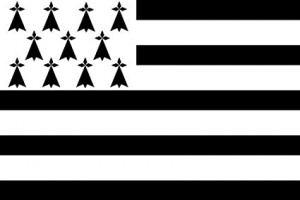Language/Breton/Grammar/Gender
Hi Breton learners! 😊
In this lesson, we will explore the gender system of the Breton language. Breton nouns can either be masculine or feminine. The gender of a noun is indicated by either its article or adjective. Knowing the gender of a noun is crucial in forming grammatically correct sentences in Breton.
Consider broadening your understanding by checking out these related lessons: Pronouns & Negation.
Breton Gender System[edit | edit source]
Breton has two genders: masculine and feminine. The gender of a noun in Breton is not always predictable, so it is important to memorize it. A general rule is that nouns ending in -er, -our, -ell, -enn, or -ezh are usually masculine, while nouns ending in -erez, -hed, or -iñ are typically feminine. However, there are many exceptions to this rule.
Definite Articles[edit | edit source]
The definite article is used to indicate the gender of a noun in Breton. The definite article in Breton has two forms: "ar" for masculine nouns and "an" for feminine nouns. Here are some examples:
| Breton | Pronunciation | English |
|---|---|---|
| ar plac'h | ar plak | the girl (feminine) |
| an den | an den | the man (masculine) |
| ar plac'heder | ar plakeder | the female student (feminine) |
| an dennerien | an denner-yen | the male students (masculine) |
Indefinite Articles[edit | edit source]
The indefinite article in Breton also has two forms: "ur" for masculine nouns and "un" for feminine nouns.
| Breton | Pronunciation | English |
|---|---|---|
| ur plac'h | ur plak | a girl (feminine) |
| un den | un den | a man (masculine) |
| ur plac'heder | ur plakeder | a female student (feminine) |
| un denner | un-denner | a male student (masculine) |
Adjectives[edit | edit source]
Adjectives in Breton must agree in gender and number with the noun they describe. For example:
| Breton | Pronunciation | English |
|---|---|---|
| ar plac'h gwenn | ar plak gwenn | the white girl (feminine) |
| an den du | an den du | the black man (masculine) |
| ar plac'heder bihan | ar plakeder bihan | the small female student (feminine) |
| an denner vras | an denner bras | the big male student (masculine) |
Practice[edit | edit source]
Let's practice identifying the gender of nouns in Breton. Look at the following words and determine if they are masculine or feminine:
| Breton | Pronunciation | English |
|---|---|---|
| moger | moger | kitten |
| breur | breur | brother |
| mamm-gozh | mamm-goh | grandma |
| traouenn | traw-en | branch |
- Person 1: Moger zo amañ. (There is a kitten here.)
- Person 2: Ur breur a zo ganeomp. (We have a brother.)
- Person 1: Mamm-gozh ma-mañ a zo sal. (My grandma here is in the living room.)
- Person 2: Ar traouenn du-kañv a zo brav. (The dark brown branch is beautiful.)
Cultural Notes[edit | edit source]
The determination of gender in Breton is based on the history and evolution of the language. It is influenced by Celtic, Latin, and French languages. While the gender system in Breton is similar to that of French, it is not as strict. For example, some masculine nouns also have a feminine form, which is not possible in French.
Breton is a Celtic language spoken in Brittany, an area in the northwest of France. It is one of the six Celtic languages and has a rich cultural heritage. The language was nearly extinct in the 20th century, but revitalization efforts have helped it regain its popularity.
To improve your Breton Grammar, you can also use the Polyglot Club website. Find native speakers and ask them any questions!
Sources[edit | edit source]
➡ If you have any questions, please ask them in the comments section below.
➡ Feel free to edit this wiki page if you think it can be improved. 😎
Other Lessons[edit | edit source]
- Conditional Mood
- How to Use Be
- Questions
- Plurals
- Adjectives
- Future Tense
- Personal Pronouns
- Pronouns
- How to Use Have
Sources[edit | edit source]

